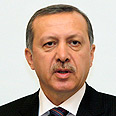
Turkish official says Iran sanctions will hurt region
Ankara's ambassador to Cairo says international community must draw lessons from handling of Saddam's regime, back Turkey, Brazil brokered fuel exchange deal with Tehran
Imposing fresh sanctions on Iran over its nuclear program would hurt the region's countries and contribute nothing to resolving the Mideast conflict, Turkey's ambassador to Cairo said Wednesday ahead of a UN Security Council vote on the matter.
Huseyin Avni Botsali told Egyptian newspaper El-Gomhuriah that the international community must draw the necessary lessons from the handling of Iraqi tyrant Saddam Hussein. According to him, the sanctions imposed against Iraq following its invasion of Kuwait did not pressure Hussein into cooperating with the UN's institutions and caused Turkey economic damage estimated at $50 billion.
Botsali added that the Gulf War undermined security along Turkey's border with Iraq.
Addressing Brazilian President Luiz Inacio Lula da Silva and Turkish Prime Minister Recep Tayyip Erdogan's attempt to broker a deal under which Iran would to send 1,200 kg of its low-enriched uranium abroad in exchange for specially processed fuel for its medical isotope reactor, the ambassador said it was "the only way to entice Iran to approach the negotiation table once again, something many international elements have been unable to do."
New York, Mexico's UN Ambassador Claude Heller, the current council president, told reporters that the Security Council vote would take place at 5 pm (Israel time) on Wednesday.
The Security Council held a private meeting Tuesday afternoon on Iran to meet some of the concerns of Brazil and Turkey, which had called for an open "political debate" on the broader Iranian nuclear issue first.
Neither Brazil nor Turkey is one of the five veto-holding permanent members of the council, although both are currently non-permanent members of the 15-member body.
After Tuesday afternoon's council meeting, US Ambassador Susan Rice predicted the resolution would be adopted by "a strong majority."
"It is a strong, broad-based resolution that will impose meaningful and significant new sanctions on Iran," she said. "Our aim remains to persuade Iran to halt its nuclear program and negotiate constructively and in earnest with the international community."
In the final version of the UN resolution, obtained Monday by The Associated Press, sanctions would be tougher than previous penalties but still far short of crippling economic punishments or an oil embargo.
The sanctions would ban Iran from pursuing "any activity related to ballistic missiles capable of delivering nuclear weapons," bar Iranian investment in activities such as uranium mining, and prohibit Iran from buying several categories of heavy weapons including attack helicopters and missiles.
Annexes to the resolution, agreed to Tuesday, would target 40 new Iranian companies or organizations, including 15 linked to Iran's powerful Revolutionary Guard.
AP and Reuters contributed to the report










